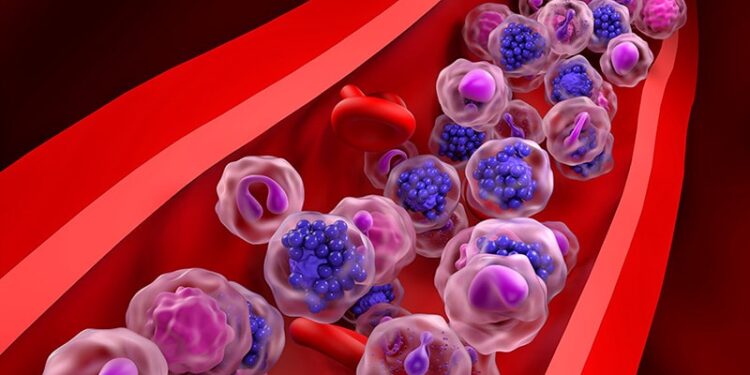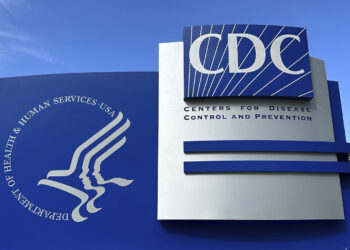TOPLINE:
Large B-cell lymphomas (LBCL) exhibit three distinct microenvironment archetype profiles defined by specific immune and stromal cell patterns. These profiles show divergent cell-cell communication pathways and correlate with different clinical outcomes following CD19 chimeric antigen receptor (CAR) T-cell therapy.
METHODOLOGY:
- Researchers employed single-nucleus multiome sequencing of 232 LBCL tumors and controls to comprehensively define the cellular landscape and stereotypical patterns in lymphoma microenvironment archetype profiles.
- Analysis included 217 lymphomas (110 newly diagnosed and 107 relapsed/refractory cases) and 15 control biopsies.
- Control tissues comprised nonmalignant reactive lymph nodes biopsied due to suspicion of lymphoma in patients with (n = 13) or without (n = 2) prior lymphoma diagnosis.
- Available remaining nuclei underwent DNA and RNA extraction followed by whole-exome sequencing (n = 174), low-pass whole-genome sequencing (n = 174), and bulk RNA sequencing (n = 208).
TAKEAWAY:
- Cell subsets co-occurred in three distinct lymphoma microenvironment archetype profiles characterized by: sparsity of T cells with high frequencies of cancer-associated fibroblasts and tumor-associated macrophages; lymph node architectural cell types with naive and memory T cells; or activated macrophages and exhausted CD8+ T cells.
- Researchers identified that divergent patterns of cell-cell communication underpinned the transcriptional phenotypes of archetype-defining cell subsets.
- The Fibroblast/Macrophage archetype showed association with inferior outcomes following first-line rituximab plus chemotherapy treatment.
- Analysis revealed that patients with T-cell exhausted archetype tumors had significantly higher rates of progressive disease as best response to CD19 CAR T-cell therapy (4/6) compared to Lymph Node archetype (0/8; Fisher test, P = .017).
IN PRACTICE:
“The assembly of nonmalignant components of human tumors into prototypical microenvironmental patterns, or archetypes, has been described across cancers. Each archetype consists of a dominant, interconnected cellular network that promotes tumor growth through divergent mechanisms. Furthermore, differences in cell frequency and function between microenvironment archetypes have been suggested as potential biomarkers for immunotherapy response,” the authors of the study wrote.
SOURCE:
The study was led by Michael Green, PhD, MD Anderson Cancer Center in Houston. It was published online in Cancer Cell.
LIMITATIONS:
According to the authors, the patient cohort’s clinical heterogeneity, while reflecting real-world population, limited their ability to directly assess associations between archetypes and outcomes. The researchers noted that the Fibroblast/Macrophage archetype is linked to high-risk features and increases in prevalence in later therapy lines, while the Lymph Node archetype is associated with low-risk features and declines in prevalence, potentially skewing distribution among treated patients. The authors acknowledged uncertainty about whether LymphoMAPs remain stable between diagnosis and relapse or change with treatment. The researchers emphasized the need for studying LymphoMAP archetypes in uniformly treated cohorts and randomized trials, preferably with biopsies at both baseline and relapse.
DISCLOSURES:
The study received funding from the Schweitzer family, the MD Anderson Lymphoid Malignancies Program and NCI P01 CA272295. Michael Green, PhD, reported ties with Sanofi, Kite/Gilead, Abbvie, Allogene, Bristol Myers Squibb, Arvinas, Johnson & Johnson, Daiichi Sankyo, and DAVA Oncology and stock ownership in KDAc Therapeutics. Todd Fehniger, MD, PhD, disclosed being an inventor on patent applications held by Washington University, as well as having relationships with Wugen Inc, Orca Bio, Indapta Therapeutics, HCW Biologics Inc, Affimed, AI Proteins, and the National Institutes of Health. Additional disclosures are noted in the original article.
This article was created using several editorial tools, including AI, as part of the process. Human editors reviewed this content before publication.
Source link : https://www.medscape.com/viewarticle/can-tumor-patterns-predict-lymphoma-treatment-success-2025a1000gc0?src=rss
Author :
Publish date : 2025-06-19 07:15:00
Copyright for syndicated content belongs to the linked Source.





